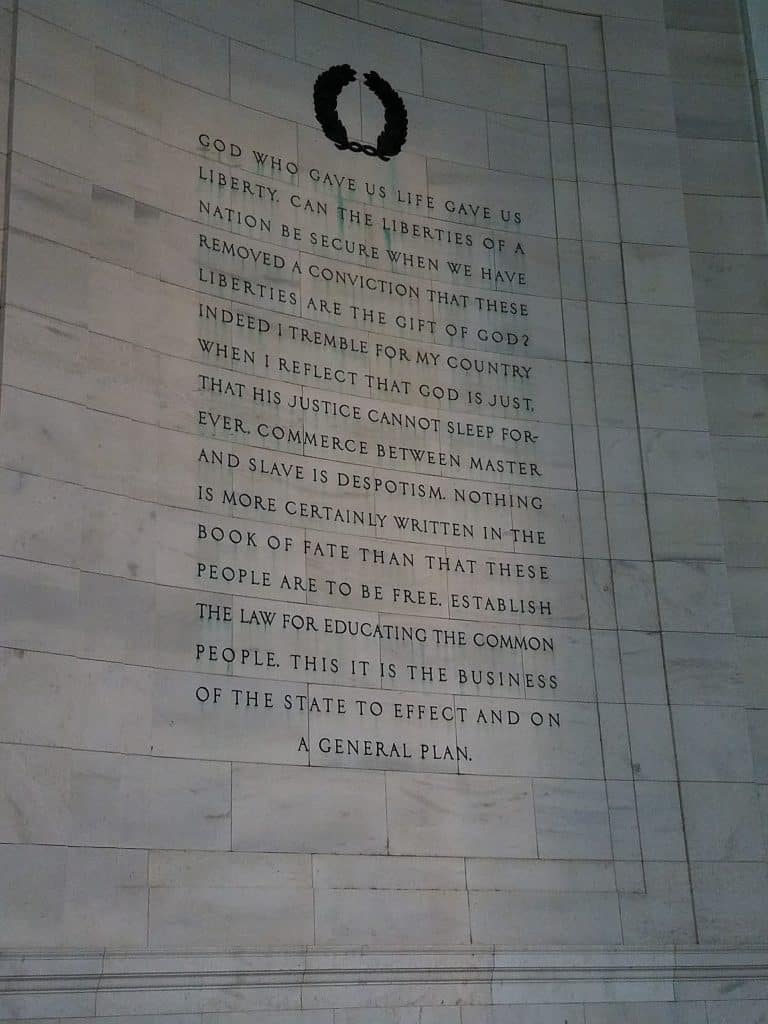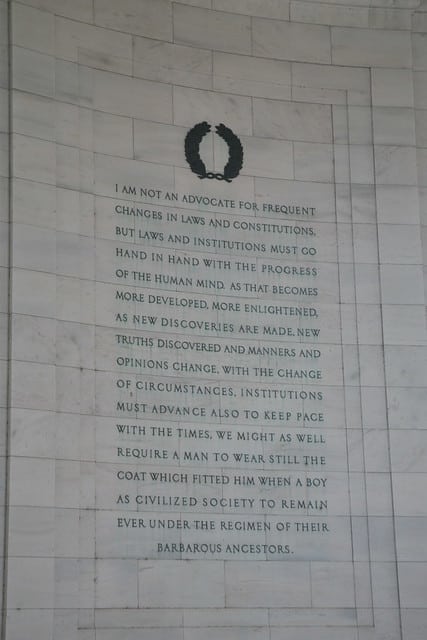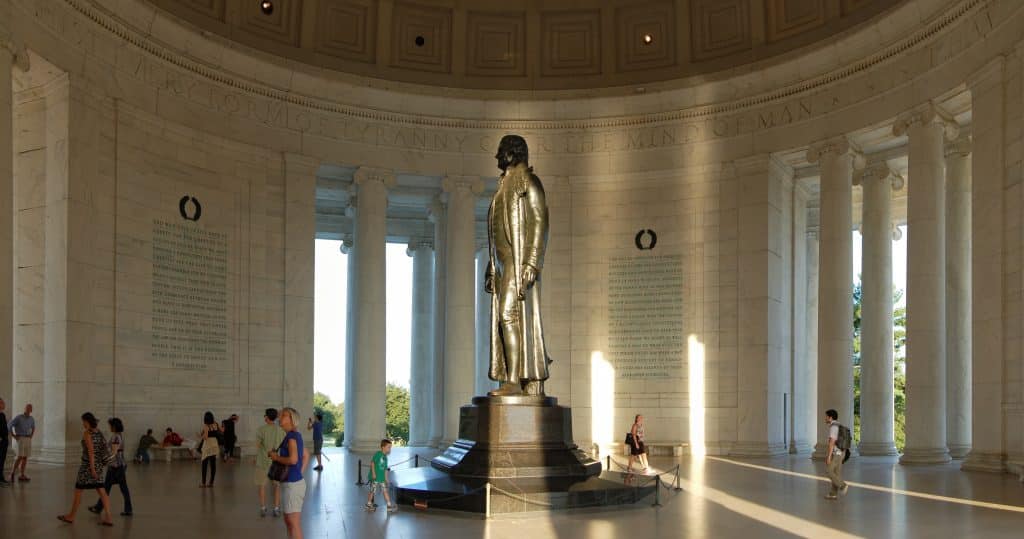Jefferson Memorial: Panel Three (Northeast Portico)
6 Separate Quotations: Northeast Portico
Although it looks as though the text etched into Panel Three of the Jefferson Memorial is a single quotation from Jefferson, it actually is a compilation of 6 separate quotations. Can you see what was lost when the context of each excerpt was stripped away?
Notice the text two-thirds of the way down: “
Nothing is more certainly written in the book of fate than that these people are to be free.

Source: Wikipedia Commons.
Individual Quotes:
These Individual Quotes are broken out on the official Monticello website into 6 separate quotations, although quotation #4 about the slaves’ freedom stops short of mentioning their deportation:
-
-
- “.. But let them [members of the parliament of Great Britain] not think to exclude us from going to other markets, to dispose of those commodities which they cannot use, nor to supply those wants which they cannot supply. Still less let it be proposed that our properties within our own territories shall be taxed or regulated by any power on earth but our own. The god who gave us life gave us liberty at the same time: the hand of force may destroy, but cannot disjoin them.” – “A Summary View of the Rights of British America“
- “.. For in a warm climate, no man will labour for himself who can make another labour for him. This is so true, that of the proprietors of slaves a very small proportion indeed are ever seen to labor. And can the liberties of a nation be thought secure when we have removed their only firm basis, a conviction in the minds of the people that these liberties are the gift of God? That they are not to be violated but with his wrath? Indeed I tremble for my country when I reflect that God is just: that his justice cannot sleep for ever . . . .” – Notes on the State of Virginia, Query XVIII1
- .. “The whole commerce between master and slave is a perpetual exercise of the most boisterous passions, the most unremitting despotism on the one part, and degrading submissions on the other. Our children see this, and learn to imitate it. . . .” – Notes on the State of Virginia, Query XVIII2
- .. The principles of the amendment however were agreed on, that is to say, the freedom of all born after a certain day, and deportation at a proper age. But it was found that the public mind would not yet bear the proposition, nor will it bear it even at this day. Yet the day is not distant when it must bear and adopt it, or worse will follow. “Nothing is more certainly written in the book of fate than that these people are to be free. Nor is it less certain that the two races, equally free, cannot live in the same government. Nature, habit, opinion has drawn indelible lines of distinction between them. It is still in our power to direct the process of emancipation and deportation peaceably and in such slow degree as that the evil will wear off insensibly, and their place be pari passu filled up by free white laborers. If on the contrary it is left to force itself on, human nature must shudder at the prospect held up. We should in vain look for an example in the Spanish deportation or deletion of the Moors.” – Jefferson’s Autobiography
- .. “Preach, my dear sir, a crusade against ignorance; establish & improve the law for educating the common people.” – Jefferson to George Wythe, August 13, 1786
- .. “It is an axiom in my mind that our liberty can never be safe but in the hands of the people themselves, and that too of the people with a certain degree of instruction. This it is the business of the state to effect, and on a general plan.” – Jefferson to George Washington, January 4, 1786
-
In Defense of Jefferson:
Some people argue that Historians should throw Jefferson out of the American pantheon for his views on race. Benjamin Schwarz argues in a March 1997 article in The Atlantic that this would be a mistake:
- Even the worst parts of the past are connected to others, and
- It “would deprive the United States of the figure central to what is singular and most admirable about the promise of American life — a promise that is already largely forgotten.
Southeast Portico: Open to “progress of the human mind” and “enlightenment”
Jefferson was a complex man. What he takes away with one hand, he gives with another.
On the opposite wall from the Northeast Portico, the Southeast Portico provides another quote from Jefferson — an edited version of a letter to Samuel Kercheval (June 12, 1816) — that indicates that Jefferson was open to changing his mind and the law. Here is the original, without the editing:

Source: Letter to Samuel Kercheval
I am certainly not an advocate for frequent and untried changes in laws and constitutions. I think moderate imperfections had better be borne with; because, when once known, we accommodate ourselves to them, and find practical means of correcting their ill effects. But I know also, that laws and institutions must go hand in hand with the progress of the human mind. As that becomes more developed, more enlightened, as new discoveries are made, new truths disclosed, and manners and opinions change with the change of circumstances, institutions must advance also, and keep pace with the times. We might as well require a man to wear still the coat which fitted him when a boy, as civilized society to remain ever under the regimen of their barbarous ancestors.
View Photo: Southeast Portico
In the Jefferson Memorial, the southeast panel advocating laws and institutions change with “progress of the human mind” appears opposite the northeast panel with the cherry-picked quote about deportation. View the full-sized panoramic photo of the Memorial to inspect the inscriptions and see both panels side by side.

Jefferson Memorial, Washington, DC. Source: Wikiquote
Background Reading: Seeing White Podcast Series: Episode 4
Notes, ed. Peden, 163. Manuscript available at Massachusetts Historical Society.↩
Notes, ed. Peden, 163. Manuscript available at Massachusetts Historical Society.↩